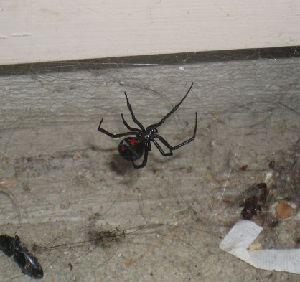Do We Have Black Widow Spiders or Not?
By Chris Williams on June 13, 2013.
 Question
Question
When I was moving a firewood pile in my yard, I almost grabbed a round, black spider that I figure must have been a black widow. It disappeared before I could see whether it had a red hourglass. I thought we didn’t have black widows in New Hampshire. Am I wrong?
Answer
It all depends on where you’re located and who you talk to. One of the three species of black widow spiders can be found in every state in the nation, but there seems to be a lot of debate as to whether we really have black widows in parts of New England.
According to the Connecticut Poison Control Center’s website:
“black widows may be found in Connecticut, Massachusetts, Rhode Island, and the southern parts of Maine, New Hampshire, and Vermont. However, black widow sightings or bites are uncommon in New England.”
Fact is, even in parts of the U.S. where black widows are pretty common, this shy spider is rarely seen.
Although the range of the northern black widow spider includes all of New England, the reason that we are not overrun with black widows is that they are not well-adapted to survive our winters. When they are found in more northern areas, it’s usually because they have been transported there in shipments of produce or other goods, or when people have moved north and taken black widows with them. Dr. Ed Tillingnast, a zoology professor and spider researcher at the University of New Hampshire, is the guy they call whenever black widows are found in the state. So far, he says, they’ve all been southern or western species of black widows, that he identifies as stowaways. He even did an experiment to see if black widow spiders could survive the winter in an unheated New Hampshire building. They all died. But that doesn’t mean that a hitchhiking spider couldn’t survive our winters indoors.
At the risk of putting you off your food, black widow spiders in New England seem to be associated with grapes. You can find several articles online about people who found black widows in their grape bunches bought in the grocery store. The New Hampshire Department of Agriculture, Markets, and Food reports an increase in black widow sightings in the last 10 years and attributes it to an increase in products imported into the state (black widows like to hide in shipping crates and pallets) and to less use of pesticides on grapes. Rest assured that your store’s produce manager is aware of the grape/black widow connection and makes sure the grapes are inspected.
All of this doesn’t really answer your question, however. Wood piles are probably the number one outdoor site where people run across black widow spiders. And, it seems that if you are in southern New Hampshire, black widows could survive the winter. However, keep in mind that there are other round, black, shiny spiders that are not black widows. They are usually smaller than the widow and they don’t have the characteristic red hourglass shape on the abdomen.
Black widow spiders are not aggressive and bite only if provoked. Their venom is toxic and bites can be very serious, especially for young, ill, or very old individuals, but bites can be treated. There have been no deaths from black widow spider bites in the U.S. in the last 10 years—but wear heavy gloves when handling that firewood!
Photo credit: michaelmcd / Foter.com / CC BY